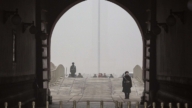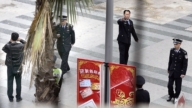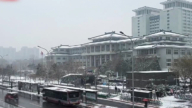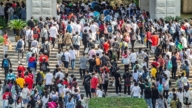【新唐人2011年4月18日訊】拆遷是中國大陸人民流不完的淚,上週,山東和四川又傳出爲了拆遷而引發的群眾抗爭事件。有學者指出,中共統治下的強拆,把全中國的財產關係帶入空前的混亂,這在將來中共獨裁消失後,將是一筆剪不斷、理還亂的糊塗賬。
據《自由亞洲電臺》的消息,山東德州市,因土地開發利益分配問題,上週四,發生群眾抗爭事件,開發商在當地土地開發項目上,排斥村民參與物資供應,而成為數百村民抗議的導火線。當局派出七八十人的公安防暴隊,暴力驅散民眾,並當場抓捕了四名村民。
村民告訴《自由亞洲電臺》,當地政府壓低了賠償費,土地被徵用了,利益卻不分給農民。
四月初,曾有村民在互聯網上提出,德州市樂陵市五里塚村徵收土地的七個疑問,村民質問:幾年前,村後的土地已經每畝3.5萬甚至4萬,如今卻只賠償3萬元﹔而德州市的文件是:盛果期棗樹每棵補償300—600元,而五里塚村卻只賠償每畝500元。
另外,去年另一個鎮的棗農,也經歷被強行徵地。
魏先生(山東德州市棗農):「一畝地三萬塊錢,你不要也不行,公檢法都來對付你,你不願意就把你的樹一夜之間拔光,甚麼也不管,(居民)就跟狗一樣無保障,三無!我們現在的人都是三無。都在徵地、開發啊!蓋商品樓。」。
另一方面,在四川成都,近千名龍橋鎮居民,向政府追討徵地賠償時,被大批警察包圍,武力鎮壓,20多人被扣押,10多人被打傷,很多居民擔心被捕,到處躱避,不敢回家。
一位龍橋鎮居民向《自由亞洲電臺》透露,他們三年前被徵地拆遷後,居民沒有獲得賠償及安置。上星期二鎮政府召集居民講解賠償問題,卻只宣讀一份在多年前發表的政策文件,並要所有人15分鐘內清場。官員說:「你們愛告到哪裏?就哪裏!」。居民在廣場靜坐抗議,但不久之後,有超過二十輛巴士,載著大約八百多名的防暴警察和政府僱用的保安到場,以擾亂秩序為名驅趕居民。
六四學生領袖王丹在《台灣與大陸的徵地糾紛體現了制度的差別》文章指出,在台灣,國民黨會擔心選票的流失,而選擇放棄發展計劃,維護2%反對拆遷居民的權益。但在中國大陸,面對土地糾紛,地方政府沒有制度上的任何硬約束,一旦群體性事件擴大,他們還可以以社會穩定為理由,要求中央政府以國家暴力來解決利益糾紛。
《北京之春》雜誌主編胡平也在《拆遷徵地之戰——搶錢與反搶錢》文章上說,雖然強拆事件是開發商和政府勾結,但是按照全國政協委員、廣州富力地產總裁張力在兩會上的發言,地方政府賣地的利潤高達200%,而開發商的利潤只有10%。
他指出:一旦中國走上民主之路,面對空前規模的財富分配不公,清理工作將極其複雜極其繁重。如果說中共當年的革命是第一次搶劫,爾後的改革則是第二次搶劫。這兩次大搶劫已經把全中國的財產關係帶入空前的混亂。我們可以想像的是,一旦中國民主了、法治了,僅僅是圍繞著土地和住房,就該有多少打不完的官司和理不清的產權。
新唐人記者吳惟、王明宇綜合報導。
Forced Demolitions, Bane of China?
Forced demolitions are Chinese people』s pain.
Last week, forced demolitions occurred again
in Shandong and Sichuan, arousing mass protests.
Experts said, forced demolitions brings China』s
property relations into chaos and it is a debt
which can hardly be cleared up after the fall of CCP
(Chinese Communist Party).
According to Radio Free Asia (RFA), last Thursday,
mass protests happened in Dezhou, Shandong,
for an unequal distribution of revenue from
land development. Developers rejected villagers』
material supply in land development projects,
arousing reaction among hundreds of villagers.
The authorities sent a riot team of 70-80
to disperse people violently, arresting 4 on the spot.
Villagers told RFA, that the local government
tried to lower the damage by utilizing the land,
but it still refused to give villagers compensation.
At the beginning of April, a villager asked online
questions on land requisition in Wulizhong, Dezhou.
He questioned, several years ago, the land
behind the village was worth RMB35,000-40,000
per mu, but now it is only RMB30,000. Dezhou』s;
official document promised to pay RMB300-600
for each jujube tree during full bearing period
but Wulizhong Village only got RMB500 per mu..
Also, jujube growers in another town
experienced forced requisition.
Mr. Wei (jujube grower in Dezhou, Shandong):
“You have to accept the deal of RMB30,000 per mu,
otherwise public security, procuratorial organs
and courts will make troubles, destroy all the trees
unscrupulously. We residents are like dogs, with no
security or anything! We normal people have now
almost no rights. They are all requisitioning and
developing land and building commodity houses.”
On the other hand, nearly 1000 Longqiao Town
residents were surrounded and forcibly repressed
by police when they were asking the government
for land compensation. Over 20 were detained,
more than 10 were hurt. Many residents
are afraid of being arrested and cannot go home.
A Longqiao Town resident told RFA, their land was
requisitioned three years ago with no compensation
or settlement. Last Tuesday, Town Government
gathered residents for compensation issues, but
ended up reading an official document released
several years ago and asking everyone to leave in
15 minutes. The officials said: “You can appeal to
whomever you want!” Residents went on a sit-down
protest, but over 20 buses came soon with around
800 riot policemen and security men who dispersed
residents with the excuse of disturbing social order.
The student leader of June 4th Incident, Wang Dan,
wrote in an article “The Land requisition in Taiwan
and China shows different political systems,”
that Taiwan』s Nationalist Party, afraid of losing votes,
will give up a development plan to protect the rights
of 2% of people who disagree. But in China, local
governments don』t have any rigid limitations facing
land disputes. Once a mass disturbance expands,
they can ask the central government to solve the
dispute by forcing social stability on the ground.”
Hu Ping, Editor in Chief of Beijing Spring, wrote in
the article “A war of land requisition, to rob and
to protect,” that though forced demolitions are result
of developers and government』s collaboration,
local governments get 200% profit while developers
only get 10%, according to Zhang Li』s (a CPPCC
member and CEO of Guangzhou Fuli Real Estate)
speech during CCP』s 』two conferences.』
Hu said: “Once China adopts democracy, the
clearance of this unprecedented unfair distribution
of wealth will be very complicated and heavy.
CCP』s previous resolution of first rob then reform
has brought China』s property relations to
unprecedented chaos. It is conceivable that
once China adopts democracy under the rule of law
there will be countless lawsuits and complicated
property issues to solve, about land and houses.”
NTD reporters Wu Wei and Wang Mingyu





























